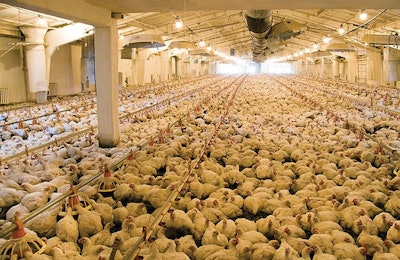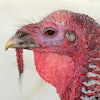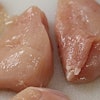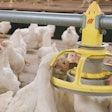
A wave of new inventions showcased at the 2018 Poultry Tech Summit could make serious strides toward improving poultry production.
Four innovators representing startup animal health companies spoke on November 7, at the inaugural event gathering poultry professionals, entrepreneurs and investors in Atlanta. The speakers, representing companies from the U.S., Canada and Israel, shared their ideas on how to improve live production.
Vaccine through feed
Jennifer Filbey, CEO of Mazen Animal Health Inc., said her company developed a way to administer vaccines directly through feed. Mazen uses genetic modification to express subunit antigens in corn seed to create vaccines. The seeds are then processed and incorporated into animal feed. The benefit of this first of its kind technology is a simplified dosing process. By eliminating water-based or gel spray vaccines or injections, the producer is able to save money and maintain a more biosecure operation, she said.

Jennifer Filbey, Mazen Animal Health | Photo by Austin Alonzo
Mazen is already working with the U.S. Department of Agriculture’s Agricultural Research Service (USDA ARS) to develop a vaccine controlling against coccidiosis. Filbey said the ARS already developed subunit antigens to combat the costly poultry disease, however the solution isn’t deployed because it isn’t cost effective. Mazen’s technology can help deliver these antigens and, along with its own patents, the company is working with the agency to secure the intellectual property.
The company already displayed proof of concept with vaccines deployed against porcine epidemic diarrhea virus (PEDV) and valley fever. Filbey said the technology could tap into the $7 billion global animal health market and projects Mazen could be worth about $1.5 billion in the near future.
Phytogenic anticoccidials
Scott Huber, director of research and discovery at TyraTech Inc., spoke about how the company is helping eliminate the need for traditional chemical anticoccidials by developing a phytogenic solution for coccidiosis. TyraTech, he said, is already selling plant-based insecticides and insect repellent for the poultry industry. Over the next five years, it hopes to apply its research in insect control to create a plant-based solution designed to attack the parasitic Coccidia microorganisms that cause the disease.

Scott Huber, TyraTech | Photo by Austin Alonzo
Right now, the company is testing the effectiveness of a solution to control the population of the microorganism as well as its oocysts and is seeing great promise in laboratory research. The next steps, he said, are encapsulation of the solution, optimization of the dosing, establishment of large scale field studies and finding a way to deploy it through either feed or water. When launched in the coming years, the company expects revenue of about $50 million a year from the anticoccidial product.
Monitoring transport quality
Joel Sotomayor, president and CEO of Transport Genie Ltd., shared details about his device for monitoring the quality of livestock transportation. He said transportation should be considered an animal welfare issue, but there’s relatively few ways to prove the condition of the birds during transport is up to standard.
His device is a combination of sensor hardware and software designed to monitor and analyze shipments of livestock and help farmers and integrators make smart decisions. The device tracks key conditions for the animals – like temperature and humidity – and can use that data in real time to turn on climate control devices, like misters, that previously were only controlled by the judgement of the driver after they pulled over. It can also ensure safe driving behavior by tracking speed and using live video. It is even capable of sending messages to dispatchers about environmental or transport conditions, Sotomayor said.

Joel Sotomayor, Transport Genie | Photo by Austin Alonzo
The result of this tracking is higher welfare for the animals, lower mortality during transportation and greater overall welfare accountability. One day, he suggested, this could inform some kind of humanely transported label claim. Right now the technology is being piloted in the company’s native Canada, but Transport Genie’s plans call for expanding to the U.S., elsewhere in the Americas and Europe.
In ovo chick sexing
Yehuda Elram, co-founder and CEO of eggXYT, said the Israeli startup holds the solution for the ethical and practical dilemma of chick sexing and disposing of undesired chicks. The startup uses CRISPR gene editing technology to modify chickens to lay eggs carrying a biomarker, which glows when exposed to a certain light. This is used to identify male eggs before they are hatched; saving the time and expense of incubating the egg, removing the need to employ some to sex chicks and creating a new revenue stream for the fertilized but unhatched eggs.

Yehuda Elram, eggXYT | Photo by Austin Alonzo
Elram said the benefits of using the technology would be ethical as well as financial. For the first time ever, consumers could purchase eggs that are produced without male chick culling on a massive scale. He said the company is already working to develop a pilot program for its process and it is not seeking funding, but rather EggXYT wants to showcase the technology to influential circles in order to help it shake the stigma associated with gene editing and genetically modified food organisms.
“Clearly this is a revolution … The world is getting more and more ready for this, but the train has left,” Elram said. “There’s lots of research and innovation going on in this field and if us, who are educated and care about the issues that I described, will build together coalitions in order to educate the public and shape the public perception and therefore help the regulators regulate this, I think we can win.”
Read more:
What Tyson Ventures sees in the future of poultry,

















